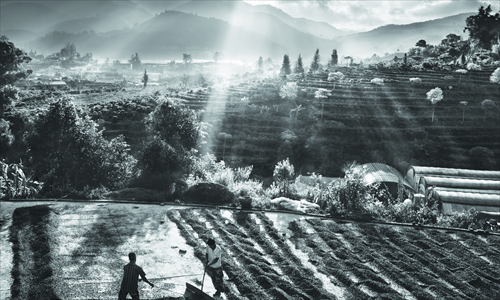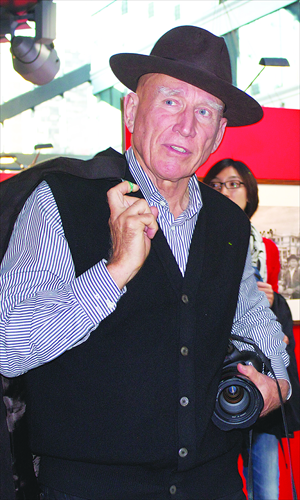Black, white and coffee

Brazilian-born and Paris-based photographer Sebastião Salgado, 66, quietly landed in Beijing two weeks ago to present and discuss photos that he took in Southwest China's Yunnan Province, to document the lives of Chinese coffee growers in rural areas earlier this year. The set of 40-odd photos portrays the anonymous faces, landscape and roots of the coffee industry in China.
Salgado's journey to rural China was part of a photo essay that took him to coffee plantations in Brazil, Colombia, Ethiopia, Guatemala and India. The project was commissioned by an international coffee brand to highlight and promote respect for the land, local cultures and the issue of sustainable coffee culture. The mission complemented Salgado's history, professional aim and artistic style, as his father had owned a small coffee business and he himself left a career as an economist to portray the "unblemished faces of nature and humanity," in black and white (B&W).
With a fedora on his head and a camera in his hand, Salgado skimmed along the exhibition, photographing people who were gazing at his own photos. It was a low-profile event that brought Salgado and his wife, Lélia Wanick Salgado, for a short presentation in Beijing. The small audience that was waiting for the award-winning photographer at Galleria illy, a space that is a high-end coffee shop and art gallery, was representative of neither Salgado's popularity nor of locals' rising interest in photography. The lack of glamor, however, didn't wilt Salgado's enthusiasm for talking about his life and photography.
Chinese blend
"Coffee is in my blood," said Salgado, explaining how he got involved with the coffee photo essay. "My father owned a coffee business in the countryside in Brazil, so ever since I was a child, I can remember opening a package of coffee beans that came directly from the field," he explained. Until the age of 16, Salgado helped his father with his small coffee business. After studying economics, Salgado wrote his thesis about coffee and worked for about three years with the International Coffee Organization, often traveling to Africa on missions for the World Bank until 1973.
"Consumers don't realize that coffee isn't grown in the backyard of a supermarket. There are millions of families, about 25 million families, in the world that work hard and rely on coffee for their survival," Salgado explained, adding that it was a pleasure to document the process and the people behind the coffee.
China's coffee industry was a big surprise for Salgado. "I had no idea that China produced coffee - loads of it - and it is excellent!" said the photojournalist who visited coffee plantations particularly in Baoshan and Simao of Yunnan Province, the latter famous for its pu'er tea. Salgado's photos show huge plantations, generations of families and the processing that beans undergo before the drink is brewed and served in a cup.
"But coffee production in China is different from what you see in other countries," noted Salgado. "Chinese coffee producers are 50 years ahead of what I saw in other countries."

A new country
"When I first came to China, it was a different country. Everything has changed," said Salgado, who visited the country in the 1990s for his photo essay "Migrations: Humanity in Transition," which chronicles the plight of immigrants and refugees. A migrant himself, Salgado left Brazil as part of an exodus of young intellectuals during the dictatorship in 1969 to avoid imprisonment, and settled in Paris.
"Back then, nobody knew China. Now it is a rich country," he told the Global Times. "Beijing was a small city surrounded by fields, there were millions of bicycles and only a few cars ... Now the city is immense," he noted, comparing Yunnan, a landscape of great beauty where man's presence is respectful and discreet, to Beijing, where thousands of buildings and people consume energy in a way that damages the environment.
Salgado also talked about the importance of "militant photography," the documentary style that he has embraced since he discovered photography at the age of 26 when he began experimenting with his wife's Leica camera.
Humanitarian eye
Salgado abandoned his career as an economist and switched to photography in 1973. He made a name for himself when he photographed the assassination attempt on former US President Ronald Reagan in 1981 in Washington, DC. At the time he was a freelance photographer with Magnum Photos and was on assignment for the New York Times. After that, Salgado switched from news to documentary photography and went on to travel to over 100 countries in the world and earn the title of UNICEF Ambassador.
Salgado's eye usually turns to remote communities, the underprivileged and the distressed, wildlife and the environment. But instead of exposing misery or sadness, his frame and style capture human dignity and hope in less fortunate contexts. "I wanted to relive my story [by revisiting migrants, coffee plantations, native communities]. I always feel driven to travel and document people, society," he said.
In the last 36 years he has won numerous major photographic awards. He switched from analogic to digital but he remains loyal to B&W and photographing against the light. "B&W is what I know best," he said. "Photography is in the mind, in society and in what you want to say. Digital has increased the quality of photos in low light and allows me to choose the film speed on the fly."
Salgado mentioned that "Genesis" might be his last long-term project. The essay compiles photos of many of Salgado's previous works: "'Genesis' is an attempt to portray the beauty and the majesty of regions that are still in pristine condition, areas where landscapes and wildlife are still unspoiled, places where human communities continue to live according to their ancient culture and traditions," his website explains.
"We no longer consider ourselves animals, but we must remember this if we want to protect the planet and survive as a species," he told the audience in Beijing.
"There are millions of photographic possibilities in China," said Salgado, who is hoping to include the country on the tour of his next itinerant exhibit that will visit countries such as Canada, Brazil, the UK, Italy and Japan in 2014.
Salgado's coffee essay will be on display at Galleria illy at Parkview Green Fangcaodi (9 Dongdaqiao Road), 10am-10pm, until December 2.